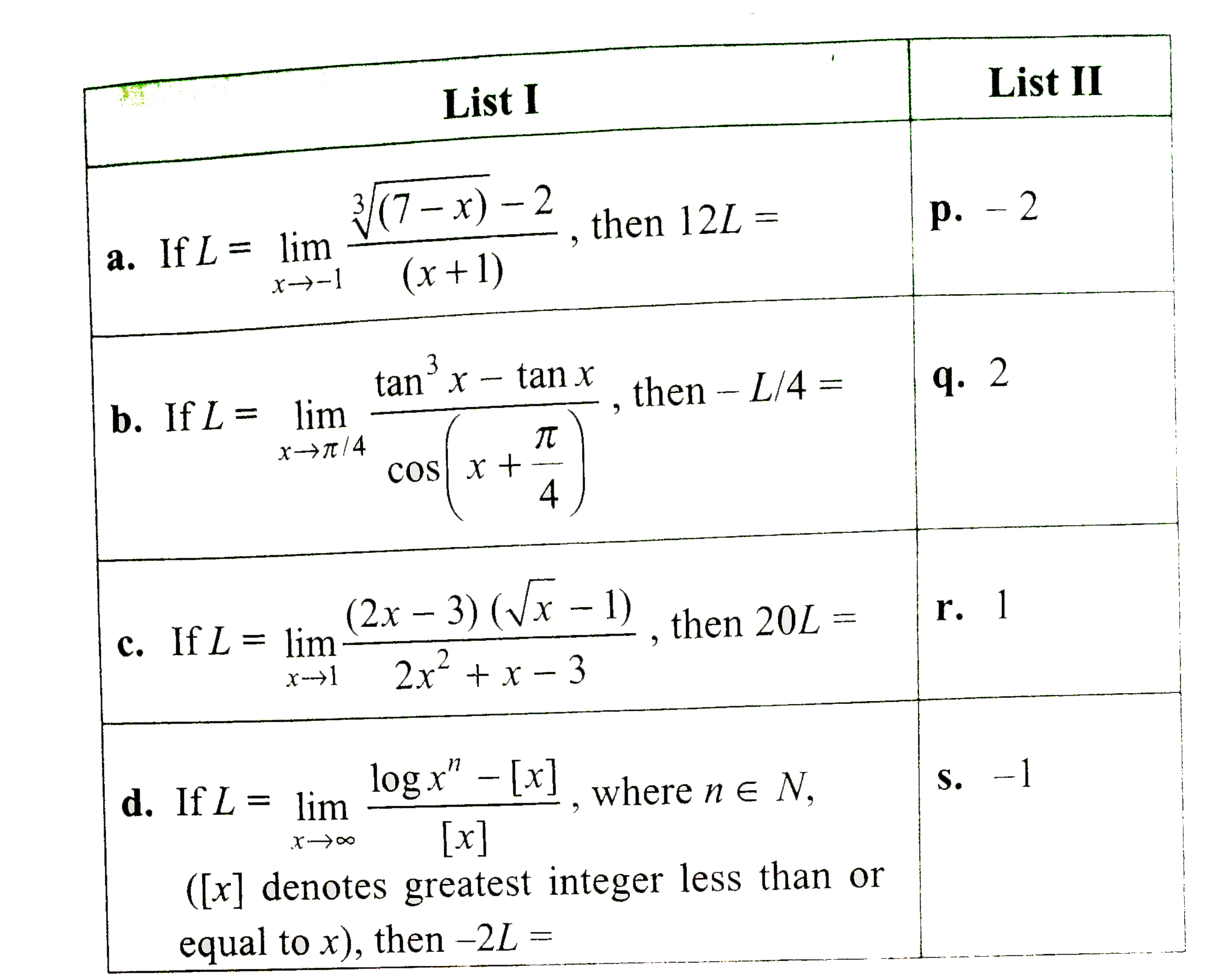(lim)x→∞(n2n2)n(n−1)isequa<o e (b) e2 (c) e−1 (d) 1Solution in Bengali
limx→0[x+|x|]x=0, where [x] denotes the greatest integer functions.
limx→0xe1x1+e1x=0
limx→3(x−3)15sgn(x−3)=0, where sgn stands for signum function.
limx→0tan−1|x|x=0
The correct Answer is:B
limn→∞(n2−n+1n2−n−1)n(n−1)=limn→∞(n(n−1)+1n(n−1)−1)n(n−1)
=limn→∞(1+1n(n−1))n(n−1)(1−1n(n−1))n(n−1)=ee−1=e2
Topper's Solved these Questions
- LIMITSBOOK - CENGAGE PUBLICATIONCHAPTER - LIMITSEXERCISE - Linked Comprehension Type
20 Videos
- LIMITSBOOK - CENGAGE PUBLICATIONCHAPTER - LIMITSEXERCISE - Matrix Match Type
5 Videos
- LIMITSBOOK - CENGAGE PUBLICATIONCHAPTER - LIMITSEXERCISE - EXERCISE 2.8
8 Videos
- JEE 2019BOOK - CENGAGE PUBLICATIONCHAPTER - JEE 2019EXERCISE - Chapter 10
8 Videos
- LINEAR COMBINATION OF VECTORS, DEPENDENT AND INDEPENDENT VECTORSBOOK - CENGAGE PUBLICATIONCHAPTER - LINEAR COMBINATION OF VECTORS, DEPENDENT AND INDEPENDENT VECTORSEXERCISE - DPP 1.2
10 Videos
Similar Questions
Letf(x)=sin−1(1−{x})×cos−1(1−{x})√2{x}×(1−{x}), where {x} denotes the fractional part of x.
L=limx→0−f(x) is equal to
View SolutionMatch the following lists:

View SolutionEvaluate limx→1cosπ2x1−√x
View SolutionIf y = y(x) is the solution of the differential equation, xdydx+2y=x2 satisfying y(1) = 1, then y(12) is equal to
View SolutionThe number of integral values of p for which (p+1)ˆi−3ˆj+pˆk,pˆi+(p+1)ˆj−3ˆk and −3ˆi+pˆj+(p+1)ˆk are linearly dependent vectors is q
View SolutionThe value of (lim)x→0[1n+e1nn+e2nn++en−1nn]is 1 (b) 0 (c) e−1 (d) e+1
View SolutionThe value of lim_ (n rarr oo) [(1) / (n) + (e ^ ((1) / (n))) / (n) + (e ^ ((2) / (n))) / (n) + .... + (e ^ ((n-1) / (n))) / (n)] is:
View SolutionIf f(n)=(lim)x→∞((1+sinπ2)(1+sinπ22)(1+sinπ2n))1x then (lim)n→of(n)= 1 b. e c. 0 d. ∞
View SolutionLtn→∞(n!nn)1n= (A) e−2 (B) e−1 (C) e3 (D) e
View Solutionlimx→∞1n{1+e1/n+e2/n+e3/n+.....+en−1n} is equal to
View SolutionThe value of (lim)n→0[1n+e1nn+e2nn++en−1nn]is
View Solution(lim)x→∞{11−n2+21−n2+......n1−n2}isequa<o 0 (b) −12 (c) 12 (d) none of these
View Solution(lim)n→∞{(nn+1)α+sin(1n)]n(when α∈Q) is equal to (a) e−α (b) −α (c) e1−α (d) e1+α
View SolutionThe value of limn→∞[1n+e1/nn+e2/nn+...+e(n−1)/nn] is
View SolutionThe value of limn→∞en(1+1n)n2is (a) -1 (b) 0 (c) 1 (d) ∞
View SolutionLtn→∞1n[e1n+e2n+....+en2]
View Solution
